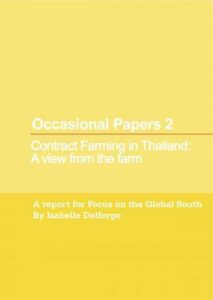12/06/2007
Under: Publications, The Commons
From small farms to fast food chains and supermarkets
The fast food retailer Kentucky Fried Chicken requires chickens that weigh exactly two kilograms in order to fit the size of the portions. Some segments of the Japanese market want okra with 5 ridges on the fruit while others require 7 ridges. Baby corn exported to Europe and Japan must be between 4 to 7 cm long. On the global food market, varieties, shapes and colours are now increasingly standardised and food safety regulations are becoming extremely strict.
To reach that level of uniformity in food production and to secure their supplies in quantity and quality, some agribusiness companies have set up their own industrial farms and plantations. However, the industry is increasingly relying on a completely different mode of production to meet its needs. Instead of investing in their own production units, the companies sign a contract with the producer, specifying exactly the product they want, the way it will be produced, the quantity, the deadlines, and the price.
According to the FAO (Food and Agriculture Organisation of the United Nation), “contract farming can be defined as an agreement between farmers and processing and/or marketing firms for the production and supply of agricultural products under forward agreements, frequently at predetermined prices. The arrangement also invariably involves the purchaser in providing a degree of production support through, for example, the supply of inputs and the provision of technical advice”. In the US, more than one in ten farm operators are receiving some income from contracts, and the value of production under contract is about 36 percent of the total agricultural production of the country. Nearly all poultry and eggs are produced under contract and this system is widely used for pigs, fruit, dairy, cotton and vegetable production.2 Contract farming raises serious concerns about food production in Thailand and other parts of Asia in terms of social justice, environment sustainability and corporate control.






